Full fledged National Ayurveda Teaching Hospital in the offing
-Director IIM
by Naalir Jamaldeen
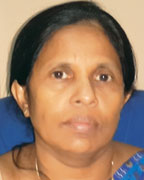 |
| Dr. M.W.S.J.
Kumari |
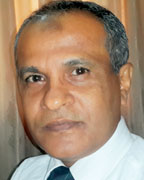 |
| Dr. A.H.M.
Mawjood |
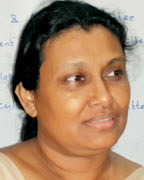 |
| Dr. Pushpa
Kulanatha |
"The Institute of Indigenous Medicine (IIM) has launched a program to
preserve Ola Leaves and medicinal books of our forefathers. Invaluable
Ola Leaves and medicinal books which depict the ancient medical history
of this country are being slowly and steadily destroyed. It is high time
to protect and preserve these invaluable books. Those who have ancient
Ola Leaves or medicinal books are requested to donate them to the
library of the IIM for preservation.
|
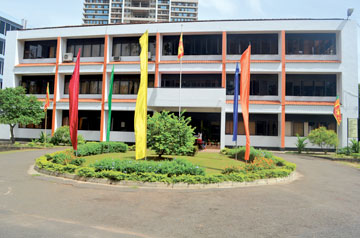
Institute of Indigenous Medicine |
"A team of experts have already started re-writing the hand-written
medicinal books", Acting Director of IIM, University of Colombo Dr.
M.W.S.J. Kumari said in an interview with the Sunday Observer.
She said that indigenous medical system yet has not been added to the
national health system. Therefore, indigenous medical practitioners face
immense difficulties in obtaining their rights. Making use of this
opportunity fake doctors also enter the industry. When this system is
added to the national medical system, the indigenous medical
practitioners will receive due recognition in the society similar to
western or modern medical practitioners. Employment in the state sector
is the next problem faced by the indigenous medical graduates (Siddha,
Unani, Ayurvedic and Traditional). Nearly 200 indigenous medical
graduates are waiting for employment for the past two to three years.
"The IIM has held discussions with various factions to improve the
indigenous medical system of this country. We held discussions with
Japanese and Russian delegations in the first quarter of this month.
They have expressed their consent to conduct research specially in
indigenous medicine and diagnostic procedures jointly with the IIM", Dr.
Kumari said.
"The Government has identified five hubs to be developed including
Education and Medicine. IIM contributes towards education (Siddha, Unani,
Ayurveda and traditional medicine) and other types of medicine in
various aspects. Traditional medicines is becoming popular in the West
as well as the Middle East and Arab countries. It is only when we
achieve excellence that we can market our medicine abroad. Every year, a
large number of tourists who are interested in Ayurvedic treatment visit
Sri Lanka.
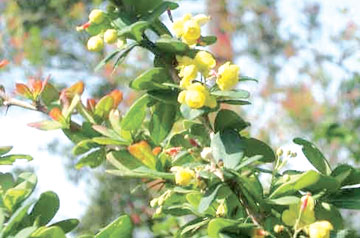
Daruharidra |
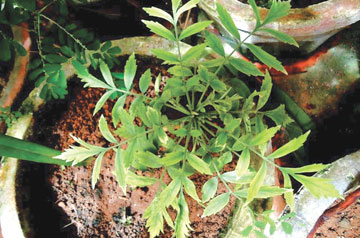
Bin Kohomba |
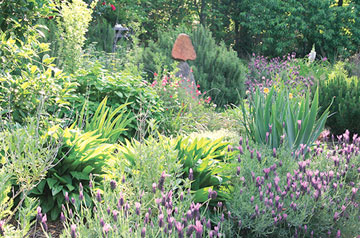
Herb garden |
Maintaining standards in the medical system is vital and it is only
then that we can attract more foreigners towards this ystem. The
development of the indigenous medical system has also been included in
the future vision of "Mahinda Chinthana", Dr. Kumari said.
"We have introduced some optional subjects in the new syllabus.
Courses are conducted in theEnglish Medium. The IIM is equipped with
modern technology to cater to the future needs of the country", she
said.
"Recently we held a discussion with the Higher Education Minister.
The Minister appointed a committee to look into the needs of the
indigenous medical system. We are preparing a draft to establish a fully
fledged National Ayurveda Teaching Hospital. The final draft will be
prepared within one month. The Ministers of Higher Education and
Indigenous Medicine have agreed to submit a cabinet paper. Initial
discussions have already been held", Dr. Kumari said.
"Facilities of the Ayurvedic Teaching Hospitals should be improved to
upgrade the indigenous medical system. The Government has taken steps to
facilitate this. We are working in collaboration with different
Government organisations to achieve our goals", she said.
Meanwhile, Dr. Kumari said that the indigenous medicine system of Sri
Lanka has a long history. Some people practise this system traditionally
for generations. They are called paaramparika Vidyaas (traditional
medical practitioners).
She said that those who practice the Ayurvedic medicine commercially
must be registered in the Ayurvedic Medical Council (AMC). This
mechanism will help to prevent the entrance of fake or bogus medical
practitioners to the industry.
"Some practise indigenous medicine from generation to generation and
have a traditional knowledge. This system is called "Paarampariya
Maruttuwam (Traditional Medicine System) in theMuslim Community.
Ayurveda is close to people since the ancient days because it was the
only available form of medicine in the country in the days gone by.
Ayurvedic theory was based on phenomena such as Vatha, Pittha and Kapha"
the Director said.
"In the case of the old generation traditional medical practitioners
being registered with the AMC was not compulsory. But the new generation
medical practitioners must register with the AMC", Dr. Kumari said.
Besides Dr. Kumari said that the AMC adds the name of registered
medical practitioners on its website. The people can seek clearance
whether a traditional medical practitioner is registered or not or
qualified or unqualified before going for treatment. These mechanisms
are useful to all medicinal systems.
"IIM is the only institution which produces Unani, Traditional and
Ayurveda graduates under one umbrella. We want to be the pioneers in
South Asia in Ayurveda, Unani, traditional medicines and allied
sciences", she said.
"We have designed our syllabus in this manner to produce skilled
graduates in indigenous medicine. This is also a means to preserve the
indigenous medical system. At the same time we equip our scholars,
students with the modern with medical sciences. The knowledge of modern
medicine helps the indigenous medical practitioner to diagnose the
disease more accurately and under accepted norms", Dr. Kumari said.
"We also teach modern technology to our student. IIM has introduced
some optional subjects in its curriculum. Astrology is taught for first
and second year. Principles of Astrology, functional foods and
neutroceuticals, cultivation and propagation of medicinal plants,
pharmacovigilance and drug safety, Ethnopharmacy, Ayurveda Beauty care,
Medical Sociology, Health Management, Health Tourism, Yoga and
meditation, Massage therapy, Aroma therapy, Introduction to Psychiatry,
Acupuncture and Traditional Chinese medicine are among the optional
subjects", she said.
Owing to these optional subjects, a subject for specialisation or
post graduation can be selected easily by students. English and
Information Technology have been made compulsory foundation subjects,
she said.
The village is the native place of traditional medicines. Traditional
medicine systems are still successfully practiced in villages for
generations, according to the Director.
Dr. Kumari said that there is a considerable demand for yoga therapy,
beauty therapy, ayurvedic and elder care.
"In Ayurveda, a variety of plant based medicines are used. Because
ours is a tropical country, we have enough vegetation. There are
minerals like copper, iron in Sri Lanka. Medicines from these minerals
are produced using high tech Ayurveda", Dr. Kumari said.
"Certain medicine ise not available in Sri Lanka and are imported
from India. There are better and suitable substitutes for certain kinds
of medicines. For example we have Venivelgeta. and is a substitute for
Daruharidra. Daruharidra is not available in Sri Lanka and has to import
from India with high cost.
Bin Kohomba has the same quality of Kiratha. Kiratha is also imported
from Nepal or India. One kilo Kiratha is sold at Rs. 7,000 in the
market. But one kilo Bin Kohomba is sold at Rs. 2,000.
Katuwelbatu is also one of the expensive medicinal crops which grow
in the dry zones very easily. Still we depend on imports for Ginger,
Saffron etc. Our people are not keen to cultivate these kinds of crops.
If we cultivate medicinal plants, outflow of huge amount of money can
be prevented and be used for research or other purposes. There are some
medicinal gardens in Sri Lanka including Haldumulla, Kanneliya, and
Navinna etc, We have to promote cultivation of medicinal plants", Dr.
Kumari said.
"Because of unavailability certain kinds of medicine are imported,
Unani medicines are imported from India and Pakistan. Due to shipping,
duration of storage and other causes the quality of imported raw
medicines cannot be assured", she said.
"Now people have started to focus attention towards Auyrvedic
medicines. Sociologists, Botanists, Biochemists, Microbiologists,
Chemists etc also pay attention towards this medical system. Ayurvedic
medicines are not contraindicated with the life style.
Now the people in the world need natural things. People are ready to
pay for natural things", she said.
"Chronicle disease has become a major problem in the country with the
increase of agro-chemical use. It is high time to go for environment
friendly approaches in the treatment process.
Ayurvedic medicines is used even for insecticide in agriculture. The
Government is also keen in organic cultivation", Dr. Kumari said.
"By existence we had our own plants and medicines. That was called as
Sinhala medicine. Ayurveda came from North India with the advent of
Buddhism. The influence of Chinese medicine was also in our medicine
system. We were introduced Acupuncture (Katuchikitsaawa). Unani
medicines came from Greece, Arabic Peninsula and the middle part of
India. Siddha medicine came from South India.
We also had our own medicine. King Buddhadasa practiced our own
medicine. King Rawana practiced this medicine and had written many books
such as Arkaprakashaya, Kumarathantraya, Uddisthantraya. King Rawana was
a good pediatrician. He also used pulse diagnosis (Naadi Vedakama)", Dr.
Kumari said.
The First National Symposium of Native Medicine (NSNM) will be held
on 19th and 20th of this month at IIM auditorium. A large number of
traditional medical practitioners who speak mainly in Tamil will
participate.
On June 28 and 29 th we held 1st National Symposium on Sri Lankan
Traditional medicines targeting the Sinhala speaking Traditional
practitioners, Head of the Unani section Dr. A.H.M. Mawjood said.
He said that this symposium will provide an opportunity to present
their creations in Tamil. The symposium will useful for Ayurveda and
Unani doctors who do researches on Unani and Traditional Medicines and
drugs. This kind of national symposiums will provide a stage to expose
their abilities.
The ways and means to develop the traditional medicine system of Sri
Lanka was discussed during the last symposium and this one too.
"Traditional medicine of this country has a history over thousand
years. Our Institute is old than 80 years. We have also added the
knowledge of traditional medical practitioners to our courses.
We have taken such kind of steps to protect the traditional medicine.
The courses of Ayurveda section has been modified in the manner to get
the knowledge of traditional medical practitioners and to train the
students about their disciplines" Dr. Pushpa Kulanatha, Acting Head of
Ayurveda section of IIM said.
She said that the attitude of students should be developed. We have
introduced certain programs to develop the attitude of students to
become a quality doctor. We also hope to develop the humanity of
students while developing their skills.
"We aim to produce a medical graduate who fit locally as well as
globally", The Acting Director Dr. Kumari said.
|

